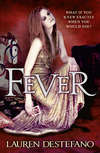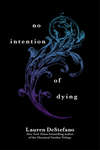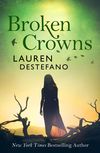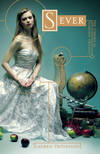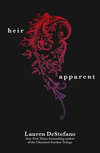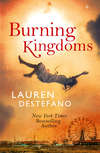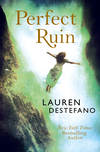Kitabı oku: «Fever»


Contents
Cover
Title Page
Dedication
1
2
3
4
5
6
7
8
9
10
11
12
13
14
15
16
17
18
19
20
21
22
23
24
25
26
27
Acknowledgments
About the Author
Praise
Other Books by Lauren DeStefano
Copyright
About the Publisher


the ocean clinging to our frozen skin.
I laugh, and Gabriel looks at me like I’m crazy, and we’re both out of breath, but I’m able to say, “We made it,” over the sound of distant sirens. Seagulls circle over us impassively. The sun is melting down into the horizon, setting it ablaze. I look back once, long enough to see men pulling our escape boat to shore. They’ll be expecting passengers, but all they’ll find are the empty wrappers from the packaged sweets we ate from the boat owner’s stash. We abandoned ship before we reached the shore, and we felt for each other in the water and held our breath and hurried away from the commotion.
Our footprints emerge from the ocean, like ghosts are roaming the beach. I like that. We are the ghosts of sunken countries. We were once explorers when the world was full, in a past life, and now we’re back from the dead.
We come to a mound of rocks that forms a natural barrier between the beach and the city, and we collapse in its shadows. From where we’re huddled we can hear men shouting commands to one another.
“There must have been a sensor that tripped the alarm when we got close to shore,” I say. I should have known that stealing the boat had been too easy. I’ve set enough traps in my own home to know that people like to protect what’s theirs.
“What happens if they catch us?” Gabriel says.
“They don’t care about us,” I say. “Someone paid a lot of money to make sure that boat is returned to them, I bet.”
My parents used to tell me stories about people who wore uniforms and kept order in the world. I barely believed those stories. How can a few uniforms possibly keep a whole world in order? Now there are only the private detectives who are employed by the wealthy to locate stolen property, and security guards who keep the wives trapped at luxurious parties. And the Gatherers, of course, who patrol the streets for girls to sell.
I collapse against the sand, faceup. Gabriel takes my shivering hand in both of his. “You’re bleeding,” he says.
“Look.” I cast my head skyward. “You can already see the stars coming through.”
He looks; the setting sun lights up his face, making his eyes brighter than I’ve ever seen, but he still looks worried. Growing up in the mansion has left him permanently burdened. “It’s okay,” I tell him, and pull him down beside me. “Just lie with me and look at the sky for a while.”
“You’re bleeding,” he insists. His bottom lip is trembling.
“I’ll live.”
He holds up my hand, enclosed in both of his. Blood is dripping down our wrists in bizarre little river lines. I must have sliced my palm on a rock as we crawled to shore. I roll up my sleeve so that the blood doesn’t ruin the white cabled sweater that Deirdre knitted for me. The yarn is inlaid with diamonds and pearls—the very last of my housewife riches.
Well, those and my wedding ring.
A breeze rolls up from the water, and I realize at once how numb the cold air and wet clothes have made me. We should find someplace to stay, but where? I sit up and take in our surroundings. There’s sand and rocks for several more yards, but beyond that I can see the shadows of buildings. A lone freight truck lumbers down a faraway road, and I think soon it’ll be dark enough for Gatherer vans to start patrolling the area with their lights off. This would be the perfect place for them to hunt; there don’t appear to be any streetlights, and the alleyways between those buildings could be full of scarlet district girls.
Gabriel, of course, is more concerned about the blood. He’s trying to wrap my palm with a piece of seaweed, and the salt is burning the wound. I just need a minute to take this all in, and then I’ll worry about the cut. This time yesterday I was a House Governor’s bride. I had sister wives. At the end of my life, my body would have ended up with the wives who’d died before me, on a rolling cart in my father-in-law’s basement, for him to do only he knows what.
But now there’s the smell of salt, sound of the ocean. There’s a hermit crab making its way up a sand dune. And something else, too. My brother, Rowan, is somewhere out here. And there’s nothing stopping me from getting home to him.
I thought the freedom would excite me, and it does, but there’s terror, too. A steady march of what-ifs making their way through all of my deliciously attainable hopes.
What if he’s not there?
What if something goes wrong?
What if Vaughn finds you?
What if …
“What are those lights?” Gabriel asks. I look where he’s pointing and see it too, a giant wheel of lights spinning lazily in the distance.
“I’ve never seen anything like it,” I say.
“Well, someone must be over there. Come on.”
He pulls me to my feet and tugs my bleeding hand, but I stop him. “We can’t just go wandering off into lights. You don’t know what’s over there.”
“What’s the plan, then?” he asks.
The plan? The plan was only to escape. Accomplished. And now the plan is to reach my brother, a thought I romanticized over the sullen months of my marriage. He became almost a figment of my imagination, a fantasy, and the thought that I’ll be reunited with him soon makes me light-headed with joy.
I had thought we could at least make it to land dry, and during the daylight, but we ran out of fuel. And we’re losing daylight by the second; it’s not any safer here than anywhere else, and at least there are lights over there, eerie as they may be, spinning like that. “Okay,” I say. “We’ll check it out.”
The impromptu seaweed wrap seems to have staunched the bleeding. It’s so carefully tied that it’s amusing, and Gabriel asks what I’m smiling about as we walk. He is dripping wet and plastered with sand. His normally neat brown hair is in tangles. Yet he still seems to be searching for order, some logical course of action. “It’s going to be okay, you know,” I tell him.
He squeezes my good hand.
The January air is in a fury, kicking up sand and howling through my drenched hair. The streets are full of trash, something rustling in a mound of it, and a single flickering streetlight has come on. Gabriel wraps his arm around me, and I’m not sure which of us he means to comfort, but my stomach is churning with the early comings of fear.
What if a gray van comes lumbering down that dark road?
There are no houses nearby—just a brick building that was maybe once a fire department half a century ago, with broken and boarded windows. And a few other crumbling things that are too dark for me to make out. I could swear that things are moving in the alleys.
“Everything looks so abandoned,” Gabriel says.
“Funny, isn’t it?” I say. “Scientists were so determined to fix us, and when we all started dying, they just left us here to rot, and the world around us too.”
Gabriel makes a face that could be perceived as disdain or pity. He has spent most of his life in a mansion, where he may have been a servant, but at least things were well-constructed, clean, and reasonably safe. If you avoided the basement, that is. This dilapidated world must be a shock.
The circle of light in the distance is surrounded by bizarre music, something hollow and brassy masquerading as cheerful. “Maybe we should go back,” Gabriel says when we get to the chain-link fence surrounding it. Beyond the fence I can see tents illuminated by candlelight.
“Go back to what?” I say. I’m shivering so hard, I can barely get the words out.
Gabriel opens his mouth to speak, but the words are lost by my own scream, because someone is grabbing my arm and pulling me through an opening in the fence.
All I can think is, Not again, not like this, and then my wound is bleeding again and my fist is hurting because I’ve just hit someone. I’m still hitting when Gabriel pulls me away, and we try to run, but we’re being overpowered. More figures are coming out of the tents and grabbing our arms, waists, legs, even my throat. I can feel the skin bunching under my nails, and someone’s skull crashing against mine, and then I’m dizzy, but some otherworldly thing keeps me violently moving in my own defense. Gabriel is yelling my name, telling me to fight, but it doesn’t do any good. We’re being dragged toward that spinning circle of light, where an old woman is laughing, and the music doesn’t stop.
Gabriel lands a perfect punch that sends one of the men crashing backward onto the dirt, but then there are others grabbing his arms and kneeing him from all sides.
“Who do you work for?” The old woman’s voice is calm. Smoke billows out of her mouth and from a stick held in her fingers. “Who sent you to spy on me?” She’s a first generation, short and stocky, with gray hair arranged in a bun encrusted with gaudy glass rubies and emeralds. Rose, who over the years had been showered by our husband, Linden, with trinkets and gems, would laugh at this cheap jewelry—the oversize pearls hanging from the woman’s chicken-skin neck; the silver bangles, rusted and peeling, that run up to her forearm; the ruby ring as big as an egg.
The men are holding Gabriel up by his arms, and he’s struggling to stay on his feet, when another man hits him. A boy, really; he can’t be any older than Cecily.
“Nobody sent us,” Gabriel says. I can see in his eyes that he’s not entirely here right now. He took the worst from our assailants, and I’m worried he might have a concussion. He takes another punch, this one to the ribs, and it sends him to his knees. My stomach lurches.
One of the men has got me by the throat, and two others by the arms, and all of them are smaller than me. It’s so difficult to see them as boys, even though that’s what they are.
Gabriel’s eyes are closing and then jolting open; his breath escapes in fluttery astonished gasps. My heart is pounding in my ears; I want to go to him, but the only thing that reaches him is my frustrated whimper. This is all my fault. I was supposed to be able to protect him; this is my world. I should have had a plan. I mutter something indignant and snap, “He’s telling the truth; we’re not spies.” Who would spy on a place like this?
Filthy girls are peeking out from a slit in the rainbow-striped tent, blinking like bugs. And I know immediately that this must be a scarlet district—a prostitution den of unwanted girls that Gatherers couldn’t sell to House Governors, or who simply had nowhere else to go.
“You shut up,” one of the men—boys—says into my ear. The old woman cackles and clatters with fake jewels that are like big glass insects and infectious boils on her fingers and wrists.
“Bring her into the light,” the old woman says. They drag me into the rainbow-striped tent below a ceiling of swaying lanterns, and the bug-girls scatter. The old woman grabs my jaw and tilts my head for a better look. Then she hocks spit onto my cheek and smears it, clearing away some of the blood and sand. Her black, horrible eyes light up with joy, and she says, “Goldenrod. Yes, I think that’s what I’ll call you.” The smoke makes my eyes water. I want to spit back at her.
The girls in the tent moan their protest, and one of them raises her head. “Madame,” she says. Her eyes are languid and filmy. “It’s after sunset. It’s time.”
The old woman backhands her, and in that same calm voice she says, as she examines her jeweled fingers, “You do not tell me. I tell you.”
The girl sinks in with the others and disappears.
Gabriel spits a mouthful of blood. The boys tug him to his feet.
“Bring her into the red tent,” the old woman says. It doesn’t matter that I’ve slumped to a dead weight and refuse to move my legs; two of the boys have no trouble dragging me away.
This is it, I think. Gabriel is going to die, and this old woman intends to make me one of her prostitutes. I can only assume that’s what those girls in the rainbow tent are. All that trouble to escape, all Jenna’s efforts to help me, for less than one day of freedom before a new hell emerged.
The red tent is lit up by lanterns that hang from the low ceiling. One of the lanterns hits my head, and when the boys let go of me, I drop to the cold earth. “Don’t go anywhere,” one of the boys, who is about a foot shorter than me, says. He pulls back his moth-eaten coat to show me a gun holstered in the waist of his pants. The other boy laughs, and they leave. I can see their silhouettes taking shape outside the zippered doorway, hear their sneering laughter.
I scan the tent for another opening I can wriggle through, but it’s rooted into the ground, and much of it is bordered by furniture. Polished, ancient-looking bureaus and trunks with things like hissing dragons painted across the drawers, cherry blossoms, gazebos, black-haired women staring sullenly into the water.
Antiques from some Eastern country that’s long gone. Rose would like these things. She would have stories for what’s saddening the black-haired women, could chart a path among the cherry blossoms that would take her where she wanted to go. For a moment I think I see what she would—an infinite world.
“Now, then,” the old woman says, appearing from nowhere and pulling me into one of two chairs on either side of a table. “Let’s take a look at you.”
Smoke ribbons up from a long cigarette held in the old woman’s wrinkled fingers. She brings it to her lips for a breath, and smoke rolls through her mouth and nostrils when she speaks again. “You are not from this place. I would have noticed you.” Her eyes, made up to match her jewels, are on mine. I look away.
“Those eyes,” she says, leaning closer. “Are you malformed?”
“No,” I say, forcing myself not to sound angry, because there’s a boy with a gun outside, and Gabriel is still at this woman’s mercy. “And we’re not spies. I keep trying to tell you. We just took a wrong turn.”
“This whole place is a wrong turn, Goldenrod,” she says. “But tonight’s your lucky night. If you’re looking for a fancier district to do business in”—she flits her fingers dramatically, letting ashes fly—“you won’t find any for miles. I’ll take good care of you.”
My stomach turns. I don’t say a word, because if I open my mouth, I’m sure I’ll vomit all over this beautiful antique table.
“I am Madame Soleski,” the woman says. “But you call me Madame. Let me see that hand.” She reaches across for my wrist and then slaps my bleeding left hand onto the table. The seaweed bandage is still holding on, though it’s bunched from my fist and dripping with blood.
She raises my hand toward the lantern and gasps when she sees my wedding band. She’s probably never seen real jewelry before. She sets her cigarette on the edge of the table and takes my hand in both of hers, examining the vines etched into my wedding band, the blossoms that Linden often copied along his building designs when he was thinking of me. They were fictional, he said. No such flower blooms in this world.
I clench my fist again, worried she’ll try to steal the ring. Even if that marriage was a sham, this small piece of it belongs to me.
Madame Soleski admires it for a moment longer, then lets go of my hand. She rummages through one of her drawers and returns with gauze that looks like it’s been used, and a bottle of clear liquid. The liquid burns when she clears away the seaweed and pours it onto my wound. It bubbles and hisses angrily. She’s watching me for a reaction, but I won’t give her one. She dresses my palm with gauze expertly.
“You’ve messed up one of my boys,” she says. “He’ll have a black eye tomorrow.”
Not good enough. I still lost the fight.
Madame Soleski fingers the sleeve of my sweater, and I resist, but she digs her fingers into my bandaged wound. I don’t want her touching me. Not my wedding band, and not this sweater. I think of Deirdre’s small, capable hands making it for me; they were etched with bright blue veins—her soft skin the only indication of her youth. Those hands could turn bathwater to magic, or thread diamonds into her knitting. Precision was in everything she created. I think of her wide hazel eyes, the soft melody of her voice. I think of how I will never see her again.
“Leave the bandage put,” she says, picking up her cigarette and tapping away some ash. “Wouldn’t want to get an infection and lose that hand. You have such exquisite fingers.”
I can no longer see the outlines of the boys standing guard outside, but I hear them talking. The gun was much smaller than the shotgun my brother and I kept in the basement, but if I could get my hands on it, I could figure it out. But how quick would I be? Some of the others might have weapons too. And I can’t leave without Gabriel. It’s my fault that he’s even here.
“Don’t speak unless spoken to, huh, Goldenrod? I like that. This isn’t exactly a talking business.”
“I’m not a part of your business,” I say.
“No?” The old woman raises her penciled eyebrows. “You look as though you have been running from some other kind of business. I can offer you protection. This is my territory.”
Protection? I could laugh. I have sore ribs and a throbbing forehead that suggest otherwise right now. What I say is, “We got a little lost, but we’ll be on our way if you’d let us go. We have family waiting for us in North Carolina.”
The woman laughs and takes a languid breath through her cigarette, her bloodshot eyes never leaving mine.
“Nobody with a family finds their way here. Come, let me show you the pièce de résistance.” She says those last words with a practiced accent. Her cigarette has run out, and she stomps it with her high-heeled shoe, which appears to be a size too small.
She leads me outside, and the boys standing guard immediately stop their laughing as she passes. One of them tries to trip me with his foot, and I step around it.
“This is my kingdom, Goldenrod,” Madame says. “My carnival of amour. You wouldn’t know what ‘amour’ is, of course.”
“It’s ‘love,’” I answer, gratified when her eyebrows raise in surprise. Foreign languages are something of a lost art, but my brother and I had the rare advantage of parents who valued education. Even if we could never use it, even if we could never grow to be linguists or explorers, the knowledge filled our minds, brightened our daydreams. Sometimes we ran through the house, pretending we were parasailing high over the Aleutians, that later we’d sip green tea under the plum blossoms in Kyoto, and at night we squinted at the starry darkness and pretended we could see our neighboring planets. “Do you see Venus?” my brother said. “It’s a woman’s face, and her hair is on fire.” We were crammed in the open window, and I answered, “Yes, yes, I see it! And Mars is crawling with worms.”
Madame wraps her arm around my shoulders and squeezes. She smells like decay and smoke. “Ah, love. That’s what the world has lost. There’s no more love, only the illusion of it. And that’s what draws the men to my girls. That’s what it’s all about.”
“Which?” I say. “Love, or illusion?”
Madame chuckles, squeezes me again. I am reminded of the long walk I took with Vaughn through the golf course that one chilly afternoon, how his presence seemed to erase all the good in the world, how it felt like an anaconda was coiling around my chest. And all the while, Madame brings me to her spinning circle of light. What is it with first generations and their collection of breathtaking things? I hate myself for being intrigued.
“You know your français,” Madame says pertly. “But here is a word I bet you haven’t heard.” Her eyes widen with intensity. “Carnival.”
I know the word. My father tried to describe carnivals to my brother and me. Celebrations for when there was nothing to celebrate, he’d say. I could understand, but Rowan couldn’t, so the next day when we woke up, there were ribbons draped all over our bedroom, and a cake was waiting on our dresser with forks and cranberry seltzer, which was my favorite, but we almost never had any because it was so hard to find. And we didn’t go to school that day. My father played strange music on the piano, and we spent the day celebrating nothing at all, except maybe that we were all alive.
“This is what carnivals were all about,” Madame says. “They called it a Ferris wheel.”
Ferris wheel. The only thing in this whole wasteland of abandoned rides that isn’t rotting or rusted.
Now that I’m close enough to really look at it, I can see that the wheel is full of seats, and there’s a little staircase leading up to the lowest point. The chipped paint reads: ENTER HERE.
“It didn’t work when I found it, of course,” Madame goes on. “But my Jared is something of a genius with electrical things.”
I say nothing, but tilt my head to watch the seats spinning against the night sky. The wheel makes a rusted creaking groan as it goes, and for just a moment, I hear laughter in that eerie brass music.
My parents have looked up at Ferris wheels. They were a part of this lost world.
One of the boys is leaning on the railing surrounding the thing, and he eyes me warily. “Madame?” he says.
“Bring it to a stop,” she says.
A cold breeze swirls around me, and it’s ripe with antique melodies and the smell of rust and all of Madame’s strange foreign perfumes. An empty seat comes to a stop before the staircase where I stand. Madame’s bracelets clack and clatter as she lays her hand on my spine and presses me forward, saying, “Go on, go on.”
I don’t think I can stop myself. I climb the stairs, and the metal shudders beneath my feet and sends tremors up my legs. The seat rocks a little as I settle into it. Madame sits beside me and pulls the overhead bar down so that it locks us in. We start to move, and I’m breathless for an instant as we ascend forward and into the sky.
The earth gets farther and farther away. The tents look like bright round candies. The girls move about them, shadows.
I can’t help myself; I lean forward, astounded. This wheel is five, ten, fifteen times taller than the lighthouse I climbed in the hurricane. Higher even than the fence that kept me trapped as Linden’s bride.
“This is the tallest place in the world,” Madame says. “Taller than spy towers.”
I’ve never heard of a spy tower, but I doubt they’re taller than the factories and skyscrapers in Manhattan. Even this wheel couldn’t claim as much. Maybe, though, it’s the tallest place in Madame’s world. I could believe that.
And as we make our way toward stars that feel frighteningly attainable, I feel myself missing my twin. He was never one for whimsical things. Since our parents’ death, he’s stopped believing in things more fantastic than bricks and mortar, less horrific than ominous alleyways where girls become soulless and men pay for five minutes with their bodies. His every moment is consumed with survival—his and mine. But even my brother, who is all practicality, would have his breath taken away by this height, these lights, the clarity of this night sky.
Rowan. Even his name feels far away from me now.
“Look, look.” Madame points eagerly. Her girls are milling below in their dingy, exotic clothes. One of them twirls, and her skirt fills up with air, and her laughter echoes like hiccups. A man grabs her pale arm, and still she laughs, tripping and flailing as he drags her into a tent.
“You’ve never seen girls as beautiful as mine,” Madame says. But she’s wrong—I have. There was Jenna, with her gray eyes that always caught the light, her grace; she would swirl and hum through the hallways, her nose buried in a romance novel the whole time. The attendants blushed and averted their eyes, she so intimidated them with her confidence, her coy smiles. In a place like this she would have been a queen.
“They want a better life. They run away, come here to me. I deliver their babies, I cure their sniffles, I feed them, keep them clean, give them nice things for their hair. They come to this place asking for me.” She grins. “Maybe you’ve heard of me too. You’ve come here for my help.” She takes my left hand with a force that rocks our car. I tense, thinking we’ll capsize, but we don’t. We’ve stopped ascending now; we’re at the top. I look out over the side. There’s no way down, and the fear starts to set in. Madame controls this thing. If I wasn’t completely at her mercy before, I am now.
I force myself to stay calm. I won’t let her have the satisfaction of my panicking; it would only empower her.
My heart is thudding in my ears.
“That boy you came here with—he is not the one who gave you this beautiful wedding ring, is he.” It’s not a question. She tries to slide the ring from my finger, but I make a fist and draw away.
“Both of you show up like drowned rats,” she says. Her laughter creaks like the rusty gears that hold our car together. “But under that you are all sparkles and pearls. Real pearls.” She’s looking at my sweater. “And he is made up like a lowly attendant.”
I can’t deny any of this. She’s managed to sum up the last several months of my life perfectly.
“Running off with your attendant, Goldenrod, behind the back of the man who made you his wife? Did your husband force himself on you? Or maybe he couldn’t satisfy you, and so you met with that boy of yours in secret—in secret, late at night, rustling in your closet among your silk dresses like a pair of savages.”
My cheeks burn, but it’s not like the embarrassment I felt when my sister wives teased me about my lack of intimacy with Linden. This is sick and invasive. Wrong. And Madame’s smoky stench is making it hard to breathe. The height is making me dizzy. I close my eyes.
“It isn’t like that,” I say through gritted teeth.
“It’s nothing to be ashamed of,” Madame says, wrapping her arm around my shoulders. I catch the whimper before it leaves my throat. “You’re a woman, after all. Women are the fairer sex. And one as lovely as you—your husband must have turned into a beast around you. It’s no wonder you found yourself a sweeter boy. And this one is sweeter, isn’t he? I can see it in his eyes.”
“His eyes?” I splutter, furious. When I open my eyes, I focus on one of Madame’s gaudy hair gems so I don’t have to look at her or the ground. “Before your henchmen beat him half to death?”
“That’s another thing.” Madame tenderly brushes the hair from my face. I jerk back, but she doesn’t seem to care. “My men know how to protect my girls. It’s a rough world, Goldenrod. You need protection.”
She grabs my chin, and her fingers press against my jawbone until it hurts. She stares at my eyes. “Or maybe,” she sings, “your husband didn’t want to pass this defect of yours on to his children. Maybe he threw you out with the trash.”
Madame is a woman who loves to talk. And the more she says, the less accurate she becomes. I realize that she couldn’t read me as easily as she thought. She’s just probing through the options, hoping to get a rise out of me. I could lie to her and she wouldn’t know.
“I’m not malformed,” I say, feeling suddenly giddy about this small power I have over her. “My husband was.”
This makes Madame beam with intrigue. She releases my face and leans close. “Oh?”
“He might have turned into a beast around me, but it didn’t matter. Nine times out of ten, he couldn’t do anything about it. And like you said, women have needs.”
Madame bounces a little, rocking and creaking our car. It’s clear she gets off on the idea of young lust. I hardly have to continue the lie; she’s writing the rest of the story herself.
“And you were forced into the arms of your attendant.”
“In my closet, like you said.”
“Right under your husband’s nose?”
“In the very next room.”
She can have whatever deranged lie she wants. But the truth, like my wedding band, is something of mine that she can’t have.
The girls, hundreds of feet below, are a chorus of giggles. They all dance with the men for a while before disappearing into tents. And Madame’s henchmen sometimes peel the opening in the tent for a glimpse.
“Oh, Goldenrod, you are a gem.” She takes my face in her hands and kisses my cheek between the words. “A gem, a gem, an absolute gem! You and I will have great fun.”
Great.
In a second we’re orbiting backward. The music is louder the closer we come to the ground, and the girls sadder.
Ücretsiz ön izlemeyi tamamladınız.


